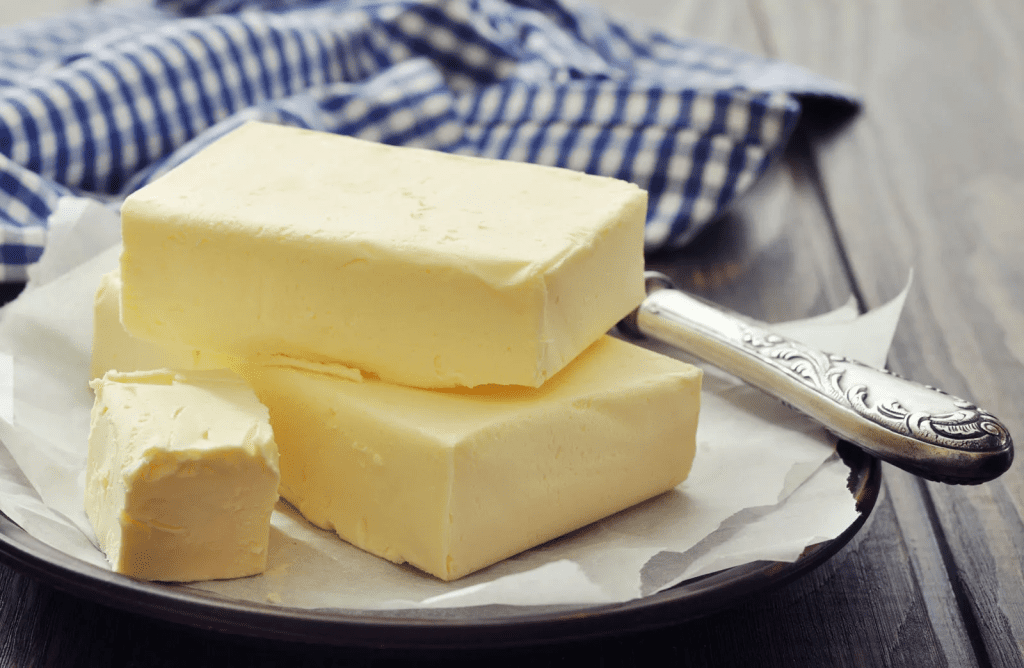We’ve all been there—you set aside a stick of butter for baking, only to forget about it for a whole week. Now, you’re staring at it, wondering, Is it still safe to use? The good news is that butter is more resilient than many other dairy products. The bad news? There are some important factors to consider before spreading it on your morning toast or using it in your next batch of cookies.
Understanding Butter’s Composition and Why It Can Stay Out

Butter is mostly fat—around 80% milk fat, with the remaining portion being water and milk solids. This high-fat content gives it a relatively long shelf life compared to perishable dairy products like milk or cream.
Unlike milk, which can spoil quickly due to bacterial growth, butter has a much lower moisture content, which helps inhibit bacterial contamination. Additionally, salted butter contains added sodium, which acts as a natural preservative, making it even more resistant to spoilage.
Does Butter Go Bad at Room Temperature?
Butter does not spoil as quickly as other dairy products, but that doesn’t mean it lasts forever. Whether or not it’s safe depends on several factors:
- Temperature – If your kitchen stays below 70°F (21°C), butter can last up to two weeks unrefrigerated. But in warmer environments, it can spoil much faster.
- Type of Butter – Salted butter is more resistant to bacteria, while unsalted butter goes bad more quickly because it lacks preservatives.
- Storage Conditions – Butter that’s left uncovered is exposed to air, light, and bacteria, which accelerates spoilage.
Signs That Butter Has Gone Bad
Before deciding whether to keep or discard butter left out for a week, check for these signs of spoilage:
1. Smell Test
Fresh butter has a mild, creamy scent. If it smells sour, musty, or rancid, it has likely gone bad.
2. Color Change
Butter should be pale yellow. If it has turned darker yellow or developed streaks, oxidation has likely occurred.
3. Texture Change
Good butter is smooth and creamy. If it feels greasy, slimy, or crumbly, it’s no longer good.
4. Taste
If you’re brave enough to do a small taste test, spoiled butter will have a bitter, off-putting flavor.
Potential Risks of Eating Spoiled Butter
While slightly rancid butter might not make you sick, consuming moldy or bacteria-contaminated butter can lead to foodborne illnesses. Some potential risks include:
- Digestive issues – Upset stomach, nausea, or diarrhea from bacteria growth.
- Unpleasant taste – Even if it’s not harmful, rancid butter will ruin the flavor of your food.
- Mold contamination – If mold has developed, it’s unsafe to eat, even if you scrape off the top layer.
Can You Still Use Week-Old Butter for Baking?
If your butter doesn’t show any signs of spoilage, it might still be usable for baking. The high heat from baking can kill some bacteria, but it won’t eliminate rancid flavors. If your butter has started oxidizing, your baked goods might taste slightly off.
For best results, use fresh butter. If you’re unsure, it’s better to be safe than sorry—especially if you’re baking for others.
How to Properly Store Butter to Extend Freshness

To keep your butter fresh and safe, follow these storage tips:
1. Store It in the Refrigerator
Keeping butter in the fridge is the best way to preserve freshness. If you only use small amounts daily, store one stick at room temperature while keeping the rest refrigerated.
2. Use a Butter Dish or Butter Bell
A butter dish with a lid keeps butter protected from air and contaminants. A butter bell (a French butter keeper) uses a small amount of water to create an airtight seal, keeping butter fresh for weeks.
3. Freeze Extra Butter
Butter freezes exceptionally well! If you have extra butter, wrap it tightly in foil or an airtight container and freeze it. It will stay fresh for up to six months.
When in Doubt, Throw It Out
If you’re still unsure whether your butter is safe to use, don’t risk it. Spoiled butter won’t just affect taste—it could make you sick. Butter is relatively inexpensive, so tossing it and starting with a fresh stick is the safest choice.
Conclusion: Is a Week-Old Butter Safe to Eat?
The answer depends on how it was stored and the conditions in your kitchen. If it has been sitting out in a cool, covered butter dish, salted butter may still be safe. However, unsalted butter or butter left in a warm room is more likely to spoil.
Before using it, check for off smells, color changes, or a bad taste. If anything seems off, it’s better to discard it and start fresh. By following proper storage practices, you can enjoy butter that stays fresh, flavorful, and safe to eat.


